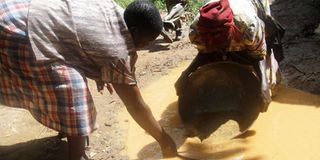Covid-19: 50 pc of women in mining experienced GBV

Women working at a local gold mine. Covid-19 led to restrictions on mining activities, leading to some of them having to work during ‘unsafe hours’ during which they experienced GBV.
What you need to know:
- A survey on the impact of Covid-19 on women in the artisanal mining sector in Kenya shows half of women experienced gender-based violence.
- The Kenya Land Alliance survey carried out in Kakamega, Migori, Kwale, Taita-Taveta, Vihiga and Nairobi counties also shows 31 per cent of women said that apart from rise in violence, Covid-19 increased the number of family break ups.
A survey on the impact of Covid-19 on women in the artisanal mining (small-scale) sector in Kenya covering six counties, shows half of women experienced gender-based violence (GBV).
The unfortunate thing is, however, that 95 per cent of women who participated in the survey observed that GBV victims do not get justice.
The Kenya Land Alliance (KLA) survey carried out in Kakamega, Migori, Kwale, Taita-Taveta, Vihiga and Nairobi counties also shows 31 per cent of women said that apart from rise in violence, Covid-19 increased the number of family break ups.
About 27 per cent said the pandemic stopped or drastically reduced operations in the mines, which directly impacted on their sources of livelihood. This has a direct link to the 15 per cent who said there was no income from support activities.
The survey findings further shows that when there is social distress or during tough economic situations, women bear the brunt more.
It targeted respondents who were immensely affected by Covid-19.
KLA Chief Executive Officer Faith Alube, said her organisation is optimistic that these findings present an opportunity to right the wrongs in gender discrimination in the sector, and a call that the policy and practice should move in the same direction.
“This is a rallying call to the need to think of how to engage to deliver women’s rights in the artisanal mining sector,” she said.
Covid-19 led to restrictions by local authorities on mining activities, leading to the women having to work in times considered ‘unsafe’ and it is during such times that they experience GBV.
“Yes, despite Covid-19, mining still continued through hide and seek, so women had to go for ore at night, putting them at risk of sexual violence,” said a respondent in the survey.
The survey yielded responses of 75 per cent female and 25 per cent male, with the most responses coming from Kakamega and Migori counties.
Some of the women who participated in the survey indicated that the lockdown measures to curb the spread of Covid-19 saw them shift to selling omena among other things, whose returns are way below what they earned in mining.
The survey recommends the need for civic education on the role of women in the household and mining industry. It also proposes that there be more spaces for women to talk about domestic violence, as well as influence policy pertaining mining at the county and national levels.
The study is expected to raise awareness on gender-based issues that are essential for creating a safe, secure, inclusive and socially just environment for women associated with the artisanal mining industry in Kenya.
Research indicates that artisanal mining accounts for more than 60 per cent of annual gemstone production in Kenya, and women play a major role.
It is particularly labour intensive and provides employment opportunity and income to a large number of people working in mines and other areas directly or indirectly associated with mining.
Women have been the hardest hit by Covid-19, with the majority being rendered jobless, out of business or being victims of GBV.
Data released by the Kenya National Bureau of Statistics(KNBS) in June last year, revealed that more than 50 per cent of working women have been rendered jobless by the pandemic.
The survey report on Socio-Economic Impact of Covid-19 on households, which was released by Treasury CS Ukuru Yatani, further revealed that more women do jobs that are vulnerable to disruption, especially in the service and manufacturing industries.





